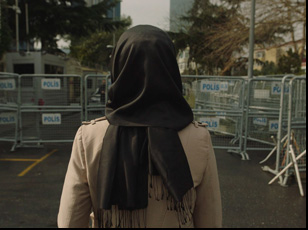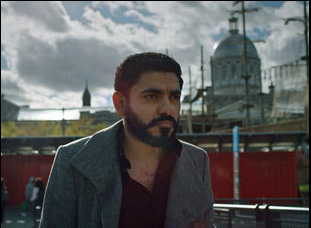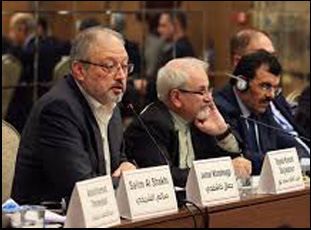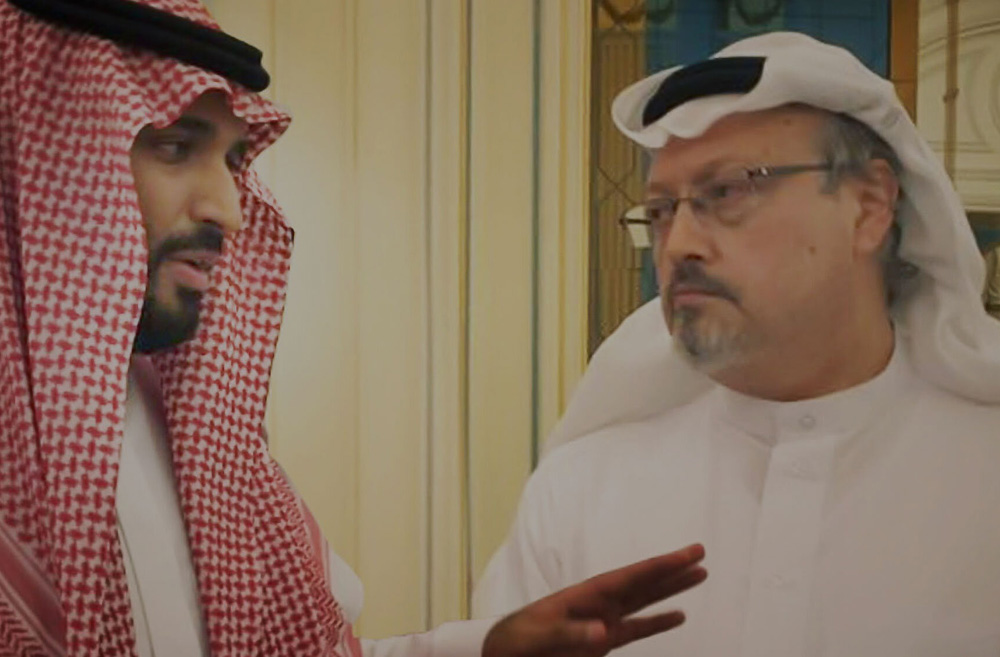It was never going to be easy finding the right way to introduce Jamal Khashoggi in “The Dissident.” The late journalist had become known the world over for his grisly death, lured to the Saudi consulate in Istanbul, Turkey where he was murdered in an elaborate plot likely engineered at the highest levels of the Saudi government after he had become a critic of Crown Prince Mohammad bin Salman after three decades of working closely with the government. However, Bryan Fogel wanted people to know Khashoggi for far more as he as he had during his investigation into the assassination plot, becoming close with his fiancee Hatice Cengiz and going through his writing to find a gentle soul that was feeling increasingly isolated by his circumstances, though that had been leavened to some degree by his online courtship with Cengiz.
Footage of Khashoggi was limited to the conferences he had spoken at or interviews where he was asked to speak to the situation unfolding in Saudi Arabia where the country had been gearing up to become an international superpower with the Crown Prince eager to spread its wealth around the globe to gain influence yet the country itself felt more cloistered when activity on social media was closely monitored, and the director of “Icarus” found even asking for that was a dicey proposition when word might get out that he was making a film about such a politically sensitive subject. Still, in being adamant about offering up a multidimensional profile of Khashoggi, one in which his spirit was very much alive, Fogel discovered some playful outtakes from an interview where a cat had jumped into his lap in between takes.
“One of my archival researchers discovered that footage as we were embarking to make the film and we were able to license and use that in really introducing Jamal to remind an audience that he was a person, that he smiled, that he laughed, that he had a sense of humor,” says Fogel. “But the goal being that if you can make an audience fall in love with your characters, they can care about the bigger subject matter of the film, which is the human rights abuses, this horrific murder and what is happening inside this authoritarian regime where people are not free to voice their opinions without fear of jail.”
As terrifying a situation as “The Dissident” depicts, Fogel has become adept at making such geopolitical horrors feel not so intimidating to process, as he did in “Icarus,” following the Russian whistleblower Grigor Rodchenkov whose revelations about the state-run doping program exposed the government’s questionable ethics in all world affairs. “The Dissident” inevitably recounts Khashoggi’s murder, but takes place largely in the present tense and you come to see how his legacy lives on as well as the threats that ultimately took his life. In tracking Omar Alabdulaziz, an associate of Khashoggi’s and now a fellow expatriate living in Canada, Fogel compellingly navigates the real world consequences of a war that’s being largely waged online, a battleground made possible by the fact that 80% of Saudi Arabia is on Twitter and the Crown Prince has invested considerable resources in creating a Twitter army to confront any attacks on his regime and monitoring the activity on people’s phones with the Israeli spyware known as Pegasus.
The Crown Prince has been able to act with impunity when so many corporations have business relationships to protect in Saudi Arabia, yet Fogel refused to be deterred in bringing these crimes to light either in filming or later in finding distribution for “The Dissident,” which would seem desirable if for no other reason than being the follow-up to an Oscar winner, but struggled to secure a major distributor. (Even Amazon, whose CEO Jeff Bezos employed Khashoggi at the Washington Post and whose phone was hacked through Pegasus in an attempt at blackmail, declined.) Powerful already, the notion that others around the world would want to limit “The Dissident” being seen adds to the impact it has when Fogel sheds light on how systemically voices are being suppressed. With the film making its way out to the world through Briarcliff Entertainment, the director spoke about how the experience of making “Icarus” emboldened him to continue telling stories that others might be fearful to take on, getting to know his central subject without ever having had the chance to meet him, and continuing to work on the film after its Sundance premiere.

I was really trying to figure out what my next project was going to be. The journey of “Icarus” led me on a journey of ultimately defending a man’s life, helping to protect a whistleblower and exposing a global scandal. Then the fallout and follow-up of that was Russia was banned from the Olympics and Grigory Rodchenkov, to this day, still lives in hiding and for fear of his life. That led me to want to continue to tell stories of impact and as the murder of Jamal Khoshoggi started to unfold in the media in October of 2018, my ears perked up because it was checking the boxes of the story that I was looking to tell — one that involved free speech, human rights, that it was a thriller in its crime. There was an emotional connection with Hatice and the cyber-security and hacking that Omar and Jamal experienced that was such a huge part of our societal fears now. All of these elements made me want to see if I could take this story on from both an activist point of view and a human rights point of view as someone who wants to fight for truth and fight against dictatorships and authoritarian regimes and hold those that commit crimes like this accountable.
With “Icarus,” you had the benefit of being with Grigory. What was it like getting to know Jamal through others?
What was pivotal to me — and this was ultimately in my exploration of building trust with Hatice, with Omar, and with the Turkish government and then my ultimate decision to take on the film — was that exploration of Jamal Khoshoggi – what he believed, what he was fighting for, what he was saying, what were his opinions? Because as much as this crime was brutal and terrible, I didn’t want to be giving a voice or take two years of my life to go make a film about somebody whose ideals I didn’t believe in. When you’re taking on a subject matter like this, there’s making a film, and then there’s essentially the personal journey and the emotional bandwidth that something like this takes up. Crafting this film, me and my creative team become deeply entrenched in these people’s lives. Hatice is mourning this unfathomable murder and Omar Abulaziz’s brother is still in jail and his friends are in prison, and there are others that are fighting for rights within this regime, so you have to feel personally connected to be able to want to tell a story like this and make their life and their pain your pain.
And as I dove more and more into Jamal and who he was, what was clear to me was this guy was a moderate. He wasn’t a friend of ISIS or a terrorist sympathizer. Yes, he had met Bin Laden in the ‘80s, but that’s when the United States was friends with Bin Laden and I had multiple researchers who were fluent in Arabic, looking up who he was and his writings and reading his old books on top of his writings for the Washington Post. What [I learned was Khoshoggi] was a moderate who was so driven to have a freedom of speech and a freedom of opinion and saw that his country was going down the wrong path. He was willing to put himself into self-exile and risk his life to bring about some semblance of freedom of press as he saw his own government push forward their false narrative and take over Twitter and jail countless journalists and anyone who dared have a differing opinion to Mohammed bin Salman. That is what made me want to take on this film.

Very early on, I believed he was going to be my protagonist. Thor Halvorsson of the Human Rights Foundation came in to back the film that I laid out early on and as I saw it, there were three variables for me and my creative team at the outset. Will Hatice work with us exclusively and only provide her information and personal voicemails and [other] evidence to us? Because if she was going to work with 20 other filmmakers, I didn’t feel like it would be effective to be able to craft a story that was outside of the newspaper headlines or what was on CNN. [Then] would Omar Alabudlaziz trust us and work with us exclusively and would the Turkish government trust me and work with me exclusively and allow access to this story that was otherwise unknown or that had otherwise not been publicly disclosed?
That began a monthslong journey of building trust and it was only really the beginning of February 2019 that I [could go back] to Thor at the Human Rights Foundation — even though we had already filmed a bunch of stuff, [because] I had been financing the project out of my own pocket because I was uneasy taking any outside money until I knew that I had these components — [when] I had this participation. But all along I thought Omar was essentially the protagonist of the film because he was alive, Jamal was dead, so as much as the movie was about Jamal, the use of Jamal could really only be through archival footage, in Omar, Jamal’s voice and what he was fighting for was there.
From the first several months, there were components that me and my creative team felt were going to be pivotal to the film. There was going to be Pegasus and that Jamal and Omar had been hacked and [we asked outselves] how were we going to cinematically bring that story to life. There was, of course, the story of the murder itself and how were we going to cinematically tell that story, but much of the journey that we went on was Hatice’s journey over that next year of trying to seek justice and accountability for Jamal’s murder and the events that were happening in Omar’s life in real time as we were filming with him. He’s living in a hotel in Montreal because it’s not safe for him to be in his home and he’s getting death threats and and as we’re filming with him, he’s receiving a phone call that in fact his brothers have been tortured and one of them said his teeth had been knocked out. These are elements that could not be predicted as we started and as you’re going on that journey in real time, that became the nuance and the structure of the story.

Being able to get those interviews and that evidence took the greater part of a year. Turkey was giving me stuff in pieces and parts. It’s like okay, we get the police footage, but we wouldn’t get all of it and then we needed more. They’d give me one interview, but I couldn’t get the president’s spokesperson and they gave me a first interview with the chief prosecutor Irfan Fidan, but I needed to wait six months to get that next interview because he wasn’t ready to tell me the story about how [the Saudi consulate] ordered 70 pounds of meat on the day that Jamal was murdered [to obscure the smell of his burning body with BBQ]. They decided to only allow me to get that part of the information months down the road. The transcript came only a month into working with Turkey and building that incredible trust that they felt comfortable enough to share that with me, knowing I wasn’t going to go out and sell that or leak that to the media. So this was a very long journey of building trust.
Of course as that happened, the film continued to take shape. Even after we premiered in Sundance, we went back and worked on the film an additional six months, honing the film and refining the story because when you have a film that goes into Sundance, you’re given six weeks to get it ready and crafting that whole sequence with the transcript was a big lift because Turkey had only provided the transcript to me about a month before Sundance. We didn’t really have that time to crack that [at the time], so there was more work, in my opinion and in my team’s, to be done.
You were recently able to have a premiere at the Zurich Film Festival with Hatice in attendance. What was that experience like?
I think of Hatice as my sister at this point — and Omar as my brother — and not only has she helped to stand behind the film and me, but we have a lifelong friendship and bond. I made this film for her and I promised to do everything I could to protect her in the unfolding of this story and bring accountability for Jamal’s murder. And whether it was coming with me to the Zurich Film Festival two months ago for our European premiere or doing press or just our daily messages to one another, it just means the world to me that I believe that hopefully I’ve made her proud to have worked with me to tell such a tragic and terrible story.
“The Dissident” will be available on video-on-demand on January 8th.




